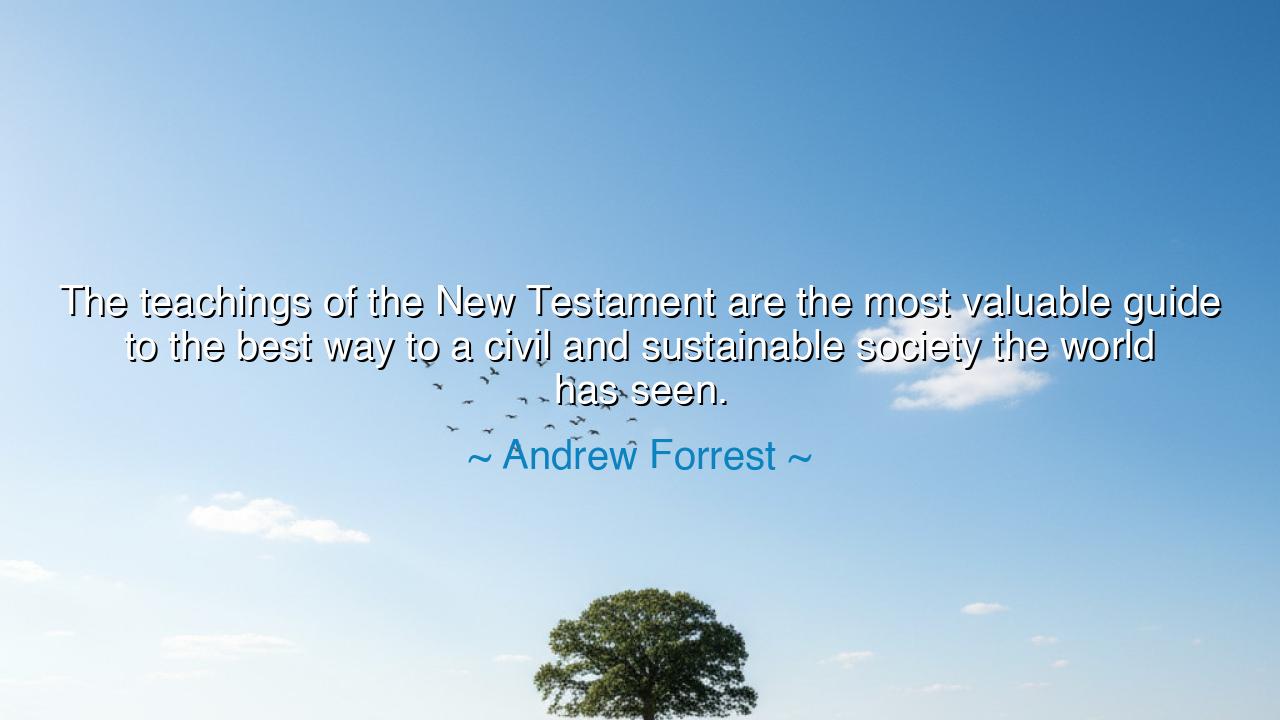
The teachings of the New Testament are the most valuable guide to
The teachings of the New Testament are the most valuable guide to the best way to a civil and sustainable society the world has seen.






The words of Andrew Forrest—“The teachings of the New Testament are the most valuable guide to the best way to a civil and sustainable society the world has seen.”—speak with the weight of timeless wisdom. For here he reminds us that the strength of a society is not built solely upon laws, wealth, or armies, but upon the teachings of compassion, forgiveness, humility, and love that the New Testament proclaims. These teachings, though born in a small corner of the ancient world, have echoed through centuries, shaping cultures, softening rulers, and calling both rich and poor to a higher vision of community.
The ancients knew that societies rise and fall according to their moral foundations. Kingdoms built on conquest may flourish for a time, but they collapse under the weight of cruelty. Civilizations devoted only to pleasure and wealth become hollow, unable to endure hardship. Yet the New Testament, with its call to love one’s neighbor as oneself, to forgive seventy times seven, to care for the least among us, laid a moral framework that has outlasted empires. Forrest rightly sees in these teachings not merely a religious doctrine, but a guide for building a civil and sustainable society, one rooted in justice, mercy, and enduring fellowship.
History gives us luminous examples. Consider William Wilberforce, the English statesman who fought for decades to abolish the slave trade. His cause was fueled by the teachings of Christ: that every human being bears the image of God and deserves dignity. Though mocked, opposed, and defeated many times, Wilberforce persisted. And at last, the chains of slavery were broken in the British Empire, not by the sword, but by the power of moral conviction drawn from the teachings of the New Testament. This is the fruit of such wisdom when applied: the lifting of oppression and the renewal of society.
Yet Forrest’s words also remind us that the New Testament is not a relic, but a living guide. Its call to feed the hungry, welcome the stranger, and turn the other cheek is no less urgent today than in the time of Rome. In an age of division, greed, and ecological strain, these teachings offer not only spiritual comfort but practical guidance. For a sustainable society must be built upon care for the vulnerable, stewardship of creation, and a recognition that the strong have a duty to protect the weak. Without such principles, the world descends into selfishness and exploitation.
This teaching carries a challenge. Many hear the words of the New Testament, but few live them. It is easy to admire the Sermon on the Mount, yet difficult to bless those who curse us. It is easy to praise the parable of the Good Samaritan, yet hard to stop and aid the wounded stranger in our path. Yet Forrest’s reminder is clear: if we desire a society that is civil, that endures, and that blesses its children, we must not only speak of these teachings but embody them in action.
The lesson for us is profound: a society is only as strong as its compassion, and only as sustainable as its justice. We must ask ourselves daily whether our choices reflect the values of love, humility, and service. Do our businesses uplift the poor or exploit them? Do our governments protect the vulnerable or abandon them? Do our personal lives embody kindness, or are they consumed by self-interest? These questions are not abstract; they are the measure of whether our society will flourish or fall.
Practically, this means taking the teachings of the New Testament into our homes, workplaces, and communities. Feed the hungry not only with words, but with food. Forgive those who wrong you, and in doing so, break the cycle of vengeance. Teach children not only to excel, but to serve. And in all things, measure success not by wealth or power, but by how much good we have brought to others. In this way, we live the truth that Forrest declares: these teachings are not just ideals, but the blueprint for the most civil and sustainable society the world has seen.
Thus, Andrew Forrest’s words endure as both reminder and command. “The teachings of the New Testament are the most valuable guide.” If we heed them, we build a society of peace, resilience, and dignity. If we ignore them, we risk repeating the errors of civilizations that rose in might but fell in arrogance. Let us then choose the path of compassion, the way of humility, the life of service—so that our society may not only endure, but shine as a light to generations yet to come.






AAdministratorAdministrator
Welcome, honored guests. Please leave a comment, we will respond soon